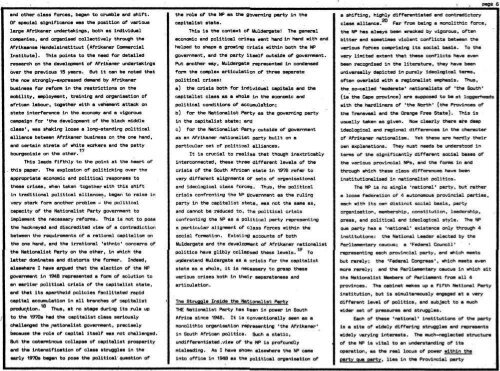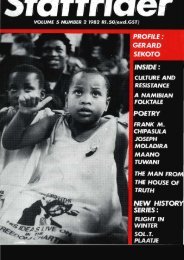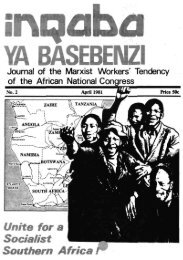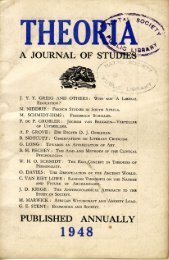You also want an ePaper? Increase the reach of your titles
YUMPU automatically turns print PDFs into web optimized ePapers that Google loves.
and othar claaa forces, began to crumble and shift.<br />
Of apaolal significance aaa the position of various<br />
large Afrikaner undertakings, both at Individual<br />
companies, and organised collectively through tha<br />
Afrikaanse Hsndeleinstltuut (Afrikaner Commerciel<br />
Institute). This points to tha need for datallad<br />
research on tha development of Afrikaner undertakings<br />
over tha pravious IS years. But it can ba notad that<br />
tha now strongly-expressed demand by Afrikanar<br />
buainaas for raform in tha raatrlctiona on tha<br />
aobllityt employment, training and organisation of<br />
african labour, togathar with a vahaaant attack on<br />
atata lntarfaranca in the aconoay and a vigorous<br />
caapalgn for *tha davalopaant of tha black middle<br />
dees', was shaking loos* a long-standing political<br />
allianca batwaan Afrikanar buainaas on tha ona hand,<br />
and cartain strata of white workers and tha patty<br />
bourgeoisla on tha other.<br />
This laada fifthly to tha point at tha heart of<br />
. this paper. Tha exploeion of politicking over tha<br />
appropriate economic end political responses to<br />
these crises, whan taken together with this shift<br />
in traditional political alliances, began to raise in<br />
vary atark form another problem a the political<br />
capacity of tha Nationalist Party government to<br />
implement tha necessary reforms* This Is not to pose<br />
the hackneyed and discredited view of a contradiction<br />
between the requirements of a rational capitalism on<br />
the one hand, end tha irrational 'ethnic' concema of<br />
the Nationalist Party on tha othar, in which the<br />
latter dominates end distort* tha former. Indeed,<br />
elsewhere I have argued that tha election of the hP<br />
government in t943 represented e form of solution to<br />
an earlier political crisis of the capitalist state,<br />
and that its apartheid policies facilitated rapid<br />
capital accumulation in all branches of capitalist<br />
production. Thus, at no stage during Its rule up<br />
to the 1970s had the capitalist class seriously<br />
challenged the notionalist government, precleely<br />
because tha role of capital Itself wes not challenged*<br />
But the coterminous collapse of capitalist prosperity<br />
and the intensification of class struggles in the<br />
early 1970a began to pose the political Question of<br />
the role of the W> as the governing party in the<br />
capitalist State.<br />
This is tha context of Uuldergatef Tha general<br />
economic and political crlawe want hand in hand with and<br />
helped to shape a growing crisis within both tha NP<br />
government, and tha party itself outside of government.<br />
Put another way, Uuldwrgate reproeented in condeneed<br />
form the complex articulation of three separate<br />
political crises:<br />
a) tha crisis both for individual capitals and the<br />
capltellet claae aa a whole in tha economic and<br />
political conditions of accumulation;<br />
b) for tha Natlonallat Party as the governing party<br />
in tha capitalist state; and<br />
c} for the Natlonallat Party cutalde of government<br />
M an Afrikaner natlonallat party built on a<br />
particular eat of political alliances.<br />
It la crucial to realise that though inextricably<br />
interconnectedt these three different levels of the<br />
crisis of the South African atata in 1978 refer to<br />
very different alignments of sets of organisational<br />
and Ideological class forcee. Thua, the political<br />
crlele confronting the NP government aa the ruling<br />
party in the capitalist state, was not the same as,<br />
and cannot ba reduced to, tha political crisis<br />
confronting the NP as a political party representing<br />
a particular alignment of clews forcee within the<br />
social formation. Existing accounts of both<br />
muldergate and the development of Afrikaner nationalist<br />
19<br />
politico have glibly collapsed thess levels. To<br />
understand Uuldargate as a crisis for tha capitalist<br />
state aa a wholea it Is necessary to grasp these<br />
verloue crises both in their aeparateness and<br />
articulation.<br />
The Struggle Inalde the Nationalist Party<br />
THE Nationalist Party has been In power in South<br />
Africa since 1906. It is conventionally seen as a<br />
monolithic omaniaetlon rapreaanting 'the Afrikaner*<br />
in South African politics. Such a static,<br />
undifferentiated .view of the NP la profoundly<br />
misleading. As I have shown elsewhere tha NP camm<br />
into office in 1948 as tha political organisation of<br />
a ehlftlng, highly differentiated end contradictory<br />
cleas alliance. Far from being a monolithic force,<br />
the NP has always been wracked by vigorous, oftwn<br />
bitter and sometimes violent conflicts between the<br />
various forces comprising its social basis. To the<br />
vary limited extent that these conflicts have avwn<br />
bean recognised in the literature, they have been<br />
univereally depicted In purely ideological termet<br />
often overlaid with a regional 1st emphasis. Thua,<br />
tha so-called 'moderate* nationalists of 'the South'<br />
Pmge G<br />
(la the Cepe province) are supposed to be at loggerheads<br />
with the hardlinare of 'the North' (tha Provinces of<br />
ths Transvaal and the Orange Free State). This la<br />
usually taken es given. Now clearly there are deep<br />
ideological and regional differancaa in the character<br />
of Afrikaner nationallme. Yet these are hardly their<br />
own explanations. They must needs ba understood in<br />
terms of the significantly different social bases of<br />
the various provlnciel NPs, and tha forms in and<br />
through which these class differences have bean<br />
Institutionalised in nationalist politics.<br />
Tha NP la no single 'national' party, but rather<br />
a loose federation of 4 autonomous provincial parties,<br />
wmch with its own distinct social basis, party<br />
organisation, membership, constitution, leadership,<br />
press, and political and ideological etyle. The NP<br />
qua party has a 'national' existence only through 4<br />
institutions: the National Leader elected by the<br />
Parliamentary caucus; a 'Federal Council*<br />
representing each provincial party, and which meets<br />
but rarely; the 'Federal Congreas', which meets even<br />
more rarely; and the Parliamentary caucus in which sit<br />
tha Nationalist ammmmTt of Parliament from all 4<br />
provinces. Tha cabinet makes up a fifth National Party<br />
institution, but le simultaneously engaged at a vary<br />
different level of politlca, and subject to a much<br />
wider sat of pressures and struggles.<br />
Each of these 'national• institutions of tha party<br />
ia a site of widely differing etrugglea and represente<br />
widely varying Interests* Tha much-neglected structure<br />
of tha NP la vital to an understanding of its<br />
operation, as tha real locus of power within the<br />
party oye party. Ilea in the Provincial party

















